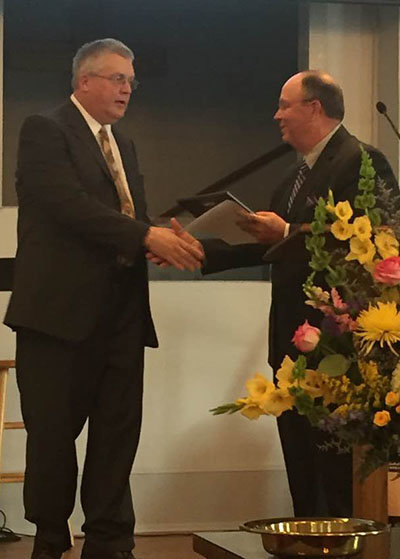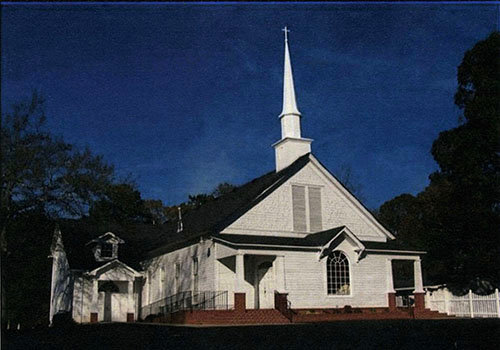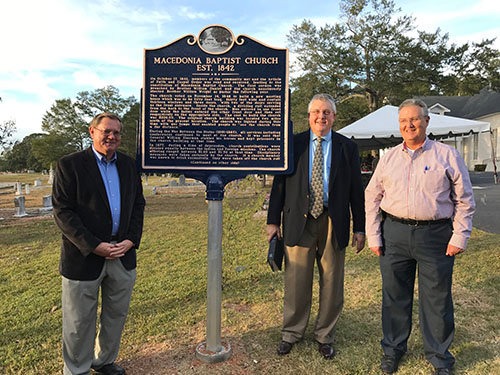 At right, Georgia Baptist Mission Board state missionary Bryan Alexander presents a plaque of recognition for Macedonia Baptist Church to Pastor David Shelton. MACEDONIA BAPTIST/Special
At right, Georgia Baptist Mission Board state missionary Bryan Alexander presents a plaque of recognition for Macedonia Baptist Church to Pastor David Shelton. MACEDONIA BAPTIST/SpecialOXFORD — Anything that lasts and makes a vital contribution to its sphere of influence for 175 years is significant. On Oct. 21-22 Macedonia Baptist Church in Oxford celebrated the day it was founded - October 17, 1842.
The theme of the two-day event was “Remembering the Past, Reaching the Future.” Saturday began with a cookout followed by the unveiling of the church’s new historic marker and a service of worship featuring the observance of the Lord’s Supper and music provided by The Master’s Voice Quartet from Snellville.
Former members were recognized including former pastors Frank Daws, currently the discipleship pastor of Zion Baptist Church in Covington, and Larry Cheek, associational missionary for Stone Mountain Association.
Sunday’s overflow crowd received greetings from Bryan Alexander, state missionary for the Georgia Baptist Mission Board, who presented a plaque to the church’s pastor, David Shelton, in recognition of Macedonia’s 175 years of serving the Lord in northern Newton County.
Alexander brought the message about reaching the future for Christ. The service closed with a prayer of dedication for the future led by Christopher Kittle, one of the church’s youths.
Macedonia was launched in 1842 when John Tyler served as the tenth president of the United States. It was the year of the first documented discovery of gold in California. On Aug. 9, 1842 the Webster-Ashburton Treaty was signed, establishing the United States-Canada border east of the Rocky Mountains. The University of Notre Dame and The Citadel, the Military College of the South, were both established in 1842.
 Founded in 1842, Macedonia Baptist Church has witnessed numerous points in United States and Georgia history while remaining a witness in its own right. MACEDONIA BAPTIST/Special
Founded in 1842, Macedonia Baptist Church has witnessed numerous points in United States and Georgia history while remaining a witness in its own right. MACEDONIA BAPTIST/SpecialIn Georgia Baptist life many were still mourning the death of Jesse Mercer, who died a year earlier. But by 1842 the Georgia Baptist Convention had grown to include the Georgia, Central, Columbus, Hephzibah, Coosa, Rehoboth, Flint River Appalachee, Sunbury, Sarepta, Western, and Washington associations and several missionary societies.
In the midst of all the national news and Georgia Baptist news, a group of people met on Oct. 17, 1842, adopted their articles of faith, and set out to establish and constitute Macedonia Baptist Church. William Daniel preached the first sermon and William Wright was unanimously elected as the pastor the following year.
The history of the church reports, “The church voted on November 14, 1846 to build a new meeting house which was to be fifty feet long, thirty feet wide, and contain thirteen windows and three doors, with two of the doors serving as the front entrance.
“Inside the church, a dividing rail extended from the back to the front of the church. Men entered in one front door while the ladies entered the other front door and then set respectively on the appropriate side. The cost to build the church was $200.00.
“The original church building was located two miles north of the present location. The church was lighted during this time with gas lamps that enabled people to ‘see the church from a far distance.’”
Oxford and Macedonia Baptist Church played a strategic role in the War Between the States. Union forces under the command of Brigadier General Kenner Garrard moved into Newton County on July 20, 1864 with orders from General William Sherman to burn the bridges over the Yellow and Alcovy Rivers and destroy the railroads. These destructive measures eliminated all communication between the Eastern Confederacy and Atlanta and brought to an end any hope that reinforcements might come to aid the defenders of Atlanta.
Sherman’s vow to “make Georgia howl” was mercilessly carried out. According to the church’s history Sherman stabled his horses and kept prisoners in the church during his time in Georgia. Sherman’s menacing presence did not deter Macedonia from faithfully holding its scheduled meetings in the building it had constructed for the worship of God.
Following the War, the nation was submerged in a dark season of depression. The historian stated, “The church offerings ranged between $1.40 and $1.50 at that time; and the contributions were equally divided between the Indian and Foreign missions.
 Left to right, Frank Daws, David Shelton, and Larry Cheek stand in front of Macedonia Baptist's new historical marker. Daws and Cheek both previously served as pastors at the church. MACEDONIA BAPTIST/Special
Left to right, Frank Daws, David Shelton, and Larry Cheek stand in front of Macedonia Baptist's new historical marker. Daws and Cheek both previously served as pastors at the church. MACEDONIA BAPTIST/Special“Disciplinary measures were taken seriously by the church. If a church member was known to drink excessively, they were taken off the church roll or 'turned out' until they acknowledged their 'wrong doing' before the church body to be reinstated.
“In 1892, under the pastorate of Rev. S.J. Swanson, the building of the present church began in order to accommodate the meetings of the Baptist Association. The church was completed in 1894. The church was remodeled in 1919, using gas lamps to light the building and wood heaters to warm the church. In that same year, Mr. Thomas G. Boggus built a communion table from a walnut tree that grew in his own yard. That communion table is still used today for the Lord’s Supper.
“From 1936 until 1950, the church experienced several renovations including the installation of a heating system and the addition of the baptistery. Between 1954 and 1962, the church added four Sunday school rooms, the choir loft, a concrete front porch, and a separate building housing a fellowship hall with additional classrooms. In 1984, construction was completed on the 2-story addition of the current fellowship hall and classrooms, enclosing the separate building into one unit.”
Since 1987 the church has restored the original Flint Hill School building across the street (currently used for the church’s student ministry and community events) and constructed a new front entrance, steeple ramp, and a foyer.
At the 175th anniversary celebration the church resolved not only to remember the past, but also to reach future generations for Christ. The guest preacher, Bryan Alexander, stated, “It was a great day and I was thrilled to be a part of the celebration.”